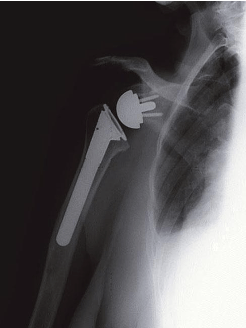By: Samantha Crisafulli, PT, DPT, Cert. DN

Whether it is from a fall or decades of arthritis, your doctor may recommend a total shoulder replacement. But what if they recommend a 'reverse' total shoulder replacement (reverse TSA)? Well, doctors recommend that a reverse TSA be used when the rotator cuff is completely torn or malfunctioning, in cases such as a major injury or severe arthritis.
Studies show that approximately 85-90% of patients who have this procedure obtain excellent pain relief. In a reverse TSA, a surgeon removes the rounded head of the upper arm bone. Using screws and special tools, he/she attaches a plastic socket to the remaining bone. The surgeon also removes part of the socket of the shoulder blade and replaces it with a metal ball, as seen in the picture to the right.
The recovery for a reverse TSA is very similar to recovery from a TSA. Patients typically spend anywhere from 2-6 weeks in a sling following surgery before beginning Physical Therapy. Patients should be able to eat, dress and do most daily activities within the first week after surgery with full recovery taking up to four months. However, it has been shown that the recovery time for a reverse TSA is faster than that of the traditional TSA and standard rotator cuff repairs.
With a referral from your doctor, a physical therapist will perform a mechanical and musculoskeletal exam that includes an assessment of your shoulder range of motion (ROM), muscular strength and soft tissue mobility (STM). Physical therapy will focus on increasing soft tissue mobilization to decrease swelling, range of motion, muscular strength and neuromotor control of the scapular muscles as well as decreasing the overall pain level, which will allow patients to return to their previous functional status. As your shoulder pain decreases and your mobility/stability improves, your therapist will provide you with a home exercise program to continue the exercises at home and prevent the risk for developing this condition again.

At Professional Rehabilitation Services, we treat a wide variety of musculoskeletal and neurological conditions using the latest in evidence-based therapies provided by highly credentialed physical therapists. Professional Rehabilitation Services has eight convenient locations in Pawleys Island, Murrells Inlet, Surfside Beach, Market Common, Myrtle Beach, Carolina Forest, Conway, Little River and Longs.
For further information on this or other related topics you can contact Richard DeFalco, DPT, OCS, CSCS, CWcHP at Professional Rehabilitation Services (Myrtle Beach) (843) 839-1300, Brian P. Kinmartin PT, DPT, MTC, STC, OCS, CWcHP (Pawleys Island) (843) 235-0200, Richard A. Owens, MPT, OCS, Cert. SMT, CWcHP (Surfside) (843) 831-0163, Jill P. Phelan, PT, DPT, Cert. DN (Conway) (843) 773-3031, Lisa O'Brien, PT, DPT, Cert. DN (Murrells Inlet) (843) 314-3224, Karl Ehlers, PT, DPT, Cert. DN (Little River) (843) 281-4222, Samantha Crisafulli PT, DPT (Carolina Forest) (843) 282-0440, Zach Daniels PT, DPT (Market Commons) (843) 213-6338, Brandon Stanley, PT, DPT (Longs) (843) 491-0388 or visit our website at www.prsrehabservices.com where you can learn more about the company and even download a referral form for your physician to fill out. You can also call and schedule a free 15-minute consultation.
